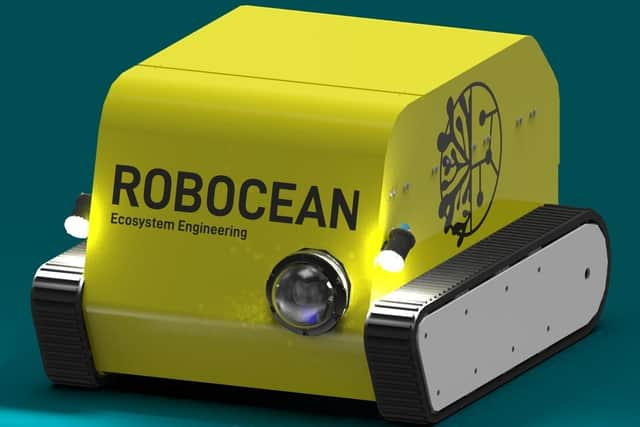Edinburgh-based, eco-friendly Robocean progressing robotics tech to help foster 'lungs of ocean' after funding boost
A team of young engineers is harnessing a funding boost to build a robot to help grow a marine plant with a major role to play in accelerating the journey to net zero, as they eye more commercialisation.
The group of eight engineering graduates from the University of Edinburgh are, thanks to help received from Converge, the Scotland-wide springboard for university entrepreneurs, progressing the £100,000 initiative to build the robot set to plant eco-friendly seagrass in a faster and cheaper way than currently available methods.
Advertisement
Hide AdAdvertisement
Hide AdExperts say the plant can absorb carbon dioxide 35 times faster than tropical rainforests, while seagrass meadows have been called “the lungs of the ocean”, but has been depleted over the past century.


It is also pointed out that it has previously taken 2,000 volunteers six months to plant just one hectare of seagrass – the equivalent of 1.5 international football pitches – at a cost of more than £200,000, but the engineers say they can reinstate Scotland and the world’s seagrass meadows in a more “affordable and equitable" way.
Two of the group – Niall McGrath and Joe Ralphs – began working full time last month at the firm the team set up, Edinburgh-based Robocean, to turn the idea into reality. The company won the 2022 Net Zero Challenge at Converge, and say the £30,000 from Converge has now allowed it to match fund a £100,000 Smart:Scotland grant awarded by Scottish Enterprise, while over the next 18 months, it aims to create what it describes as a “minimum viable product for commercial markets”.
McGrath, co-founder and chief executive of Robocean, said: “I grew up watching David Attenborough documentaries and so I’m passionate about using my skills as an engineer to help tackle climate change. When I found out that 92 per cent of Britain’s seagrass had been destroyed over the past 100 years, I realised that I’d found a problem I could help to solve.
"We’re taking a bottom-up approach to develop bespoke solutions for large-scale seagrass restoration, as opposed to adapting existing technologies designed for other purposes. Our aim is to create something which is truly versatile and scalable. This will make reinstating Scotland and the world’s seagrass meadows more affordable and equitable, not just for planting but for all aspects of the restoration process.
“The training and support we received from Converge – coupled with the grant we’ve now received from Scottish Enterprise – will allow us to develop our technology and prototype key innovative systems. Launching a business like Robocean isn’t the end game – instead, it’s a way to make a difference to the world, and we’re actively looking for partners and investors to join us on our journey.”
Its progress comes as Converge today opens applications to its 2024 programme, with more than £280,000 in funding and support available across four challenge categories – Converge, Create Change, KickStart, and Net Zero. Dr Claudia Cavalluzzo, executive director of Converge, said: “Whether it's a climate-focused business like Robocean, or a company addressing other societal needs, our goal is to foster more inclusive innovation – and harness Scotland's spirit of invention to build a better future."
Comments
Want to join the conversation? Please or to comment on this article.